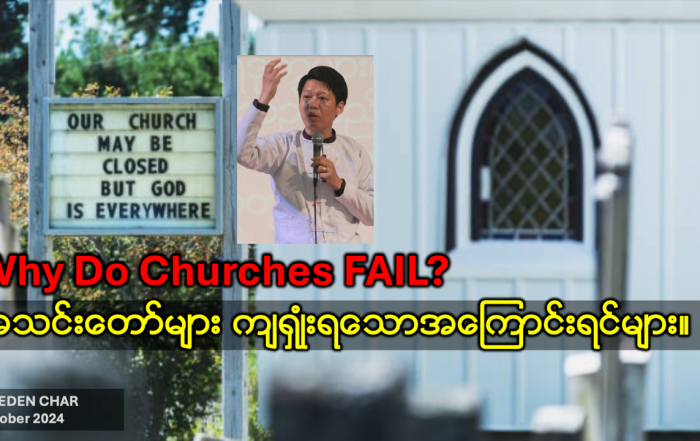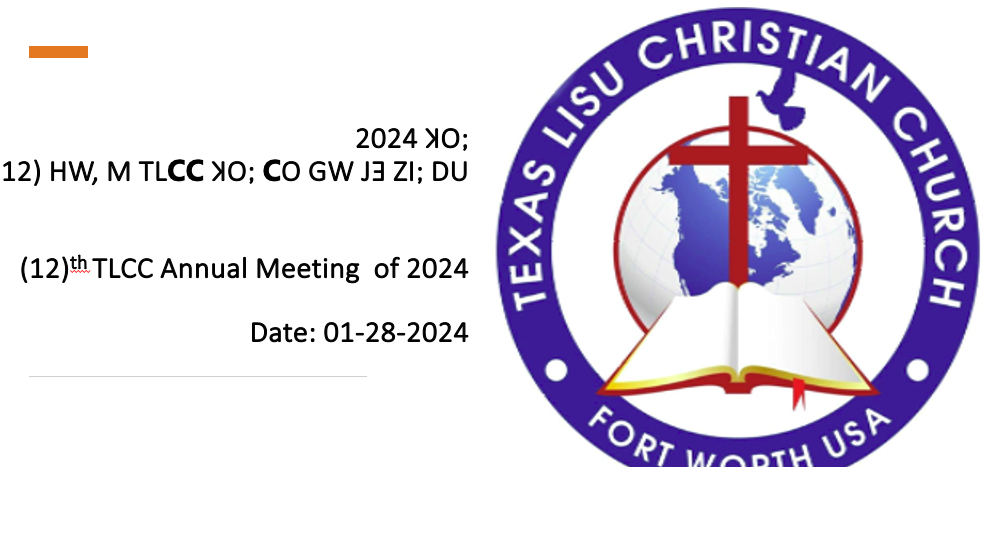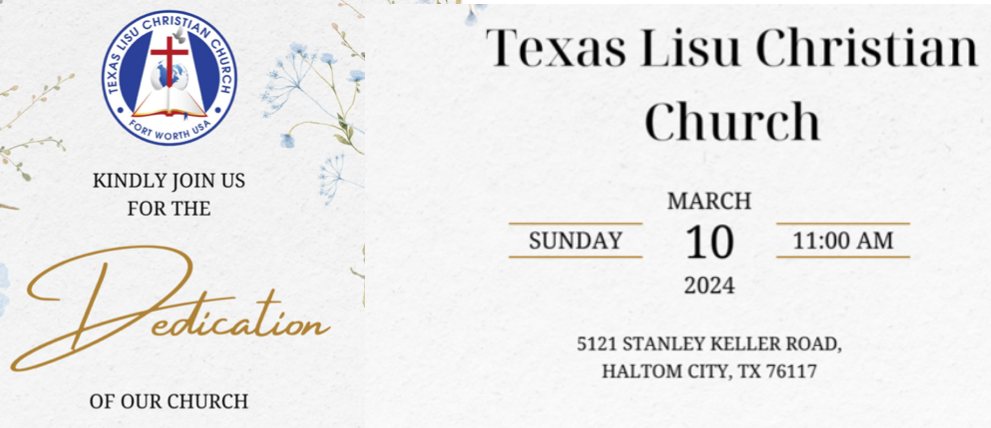About Us
About Texas Lisu Christian ChurchStatement of Faith The ScripturesWe believe that the entire Bible is the inspired Word of God and that men of God “were moved by the Holy Spirit” to write the very words of Scripture. The Bible is therefore without error (inerrant) in its original manuscripts. God has supernaturally preserved the Bible, and it is the sole and final authority for faith and life, providing encouragement, guidance, comfort and instruction for training in righteousness (2 Tim. 3:16-17; 2 Pet. 1:20-21).The Godhead (Trinity)We believe in one true God eternally existing in three distinct persons (Father, Son and Holy Spirit) each of Whom is fully and equally God; possesses all of the divine nature and attributes, and is totally worthy of our worship and service (Deut. 6:4; Matt. 28:19; John 1:14, John 10:30; 2 Cor. 13:14).God the FatherWe believe that God the Father is the first person of the Trinity and is the eternal, unchanging all-powerful, all-knowing, all-wise, all-loving, completely just and perfectly holy, sovereign Ruler and Sustainer of the universe. He is the Father of our Lord and Savior Jesus Christ and the Father of all true believers (Gen. 1:1; Eph. 4:6; John 1:12-13, John 5:19-21, John 17:1-5; Isa. 40:21-28, Isa. 43:10-13, Isa. 46:8-11; Rom. 8:14-16).God the SonWe believe that Jesus Christ is the second person of the Trinity and is the only begotten eternal Son of God Who became flesh to reveal God to man, to fulfill prophecy, and to become the Savior of the lost world. In becoming man Jesus did not cease in any way to be God so that He is fully God and fully man inseparably united in one person forever. Jesus was miraculously conceived by the Holy Spirit; born of the Virgin Mary; lived a sinless life; died on the cross as the substitutionary, all-sufficient atoning sacrifice for all of the sins of all men of all time; was buried; bodily rose from the dead; physically ascended into heaven in His glorified, resurrected body; is seated at the right hand of the Father performing His ministry of intercession; will return in the air to claim His bride the church; and will come again to earth in bodily form, personally and visibly, to conclude human history and consummate God’s eternal plan by executing judgment and ushering in His Millennial Kingdom reign to be followed by the eternal state (John 1:1,14, John 1:18; John 3:16; Luke 1:30-35; Phil. 2:5-8; Col. 2:3,9; Mark 10:45; Acts 2:22-24; John 1:29; Rom. 3:25-26; Heb. 10:5-14; 1 Pet. 2:24, 1 Pet. 3:18; John 20:20; Phil. 3:20-21; Heb. 1:3; Rom. 8:34; 1 John 2:1; Acts 1:11; Heb. 9:28; 1 Thes. 4:13-18; 2 Thes. 2:7; Matt. 24:44; Rev. 19:11-21; Rev. 21-22).God the Holy SpiritWe believe that the Holy Spirit is the third person of the Trinity Who specially came into the world on the day of Pentecost to glorify Christ and to enable men to appropriate the salvation wrought by Christ. He is the primary agent for the conviction of sin and for regeneration. Simultaneously with salvation, the Holy Spirit imparts new life, baptizes the believer into the body of Christ (His church), permanently indwells the believer, and securely seals the believer unto the day of redemption. The Holy Spirit fills (directs and controls) those believers who are yielded to Him, enables believers to bear fruit, and empowers believers to live a life free from sin’s dominion. We also believe that the Holy Spirit gives spiritual gifts to believers for the purpose of edifying the church in accordance with the teachings of scripture (1 Cor. 13:8, 1 Cor. 14:22; John 16:7-8; 1 Cor. 6:19, 1 Cor. 12:13; Eph. 1:13-14, Eph. 4:30; Gal. 5:16-17, Gal. 22-23; Rom. 8:5-13; 1 Pet. 4:10-11; Rom. 12:3-8).ManWe believe that man was created in the image of God by direct act of God and did not come into being as the result of evolution. Man was created to glorify God, worship and serve Him, and have fellowship with Him. Man fell through sin by disobeying God, thus incurring both physical and spiritual death, which alienated him from God. Man’s nature was thus corrupted and he is utterly lost, “dead in trespasses and sins,” and totally incapable of saving himself and coming back into right relationship with God by his own merit or effort (Gen. 1:26, Gen. 2:6,17, Gen. 3:17-24; Isa. 59:1-2; Rom. 3:9-19,23, Rom. 5:8; Luke 18:26-27; Eph. 2:13).SatanWe believe that Satan is the instigator of evil and a real spirit being, not simply the personification of evil. He is a fallen angel who, under the sovereign permission of God, has been given temporary rulership of the earth. He was utterly defeated at the cross, but the execution of his judgment has been postponed by God until after the Millennial Kingdom when he will be cast into the eternal lake of fire. In the meantime, he deceives the world and seeks to establish his counterfeit kingdom on earth to discredit and blaspheme God and to tempt, accuse, attack and destroy believers. He can be resisted by the believer through faith and reliance on the power of the Holy Spirit (Gen. 3:1-5; Isa. 14:12-17; Ezek. 28:11-19; Job 1-2; 1 John 5:19; 2 Cor. 11:14; 1 Tim. 3:6; 1 Pet. 5:8-9; James 4:7; Rev. 12:9, Rev. 20:1-3, Rev. 7-10).SalvationWe believe that the shed blood of Jesus Christ on the cross provides the sole basis for forgiveness of sins and salvation, which is the free gift of God’s grace. Salvation is effected by the regenerating work of the Holy Spirit and cannot be secured by man’s works or personal merit. Salvation is only appropriated by a person placing his faith in the finished work of Christ. Repentance is a turning toward God and away from sin and is a part of but not separate from believing faith. “The Gospel is the power of God for salvation to everyone who believes” and those who receive Jesus Christ by faith are born again, have their sins forgiven, become children of God, are a new creation in Christ, and “are sealed by the Holy spirit unto the day of redemption” being kept by the power of God (Eph. 1:7:13-14; John 1:12-13, John 3:1-7, John 14-16; 2 Cor. 5:17; Rom. 1:16, Rom. 10:9-10; Eph. 2:8-10; Rom. 8:14-17, Rom. 31-39; John 10:27-29, Rom. 14:6; Acts 26:20; 1 Pet. 1:3-5).The Christian LifeWe believe that every Christian should live for Christ and not for himself and should, by the power of the indwelling Spirit, allow Christ to manifest His life through him to God’s glory. By ever increasing obedience to the Word of God, each believer should mature and progressively become more like Jesus. In the power of the Spirit, each believer should live a holy life; not fulfill the lusts of the flesh; exercise his spiritual gifts to build up the body of Christ; witness for Christ; be personally involved in making disciples to fulfill the great commission; perform good works and bear fruit to the glory of God (Gal. 2:20; 1 Pet. 1:15-16, 1 Pet. 2:11; 2 Cor. 5:14-15; Rom. 6:11-13; Eph. 2:10, Eph. 4:11-12, Eph. 4:22-24; 1 Pet. 4:10-11; Acts 1:8; Matt. 28:18-20; Col. 1:10; John 15:8,16).The ChurchWe believe that the church is the body of Christ of which Jesus is the Head and whose members are those who have truly received Christ by faith. The local church is a tangible expression of the body of Christ in a particular location. Since all members of the body of Christ are united in Christ by the same Spirit, they should live in love, harmony and unity, being intent on the same purpose and accepting those sectarian or denominational practices which are based on a sincere interpretation of the Bible, which do not relate to substantive doctrinal matters, and which do not in practice cause disunity or hinder the ministry. The purpose of the church is to make Christ known to lost men and to make disciples, and glorify God on earth (Acts 1:8; 1 Cor. 12:12-27; Eph. 1:20-23, Eph. 4:1-6, Eph. 4:12-16; Matt. 28:18-20; John 17; Col. 1:24-29).
ꓕꓯꓼ-ꓢ ꓡꓲ-ꓢꓴ ꓙꓲ-ꓢꓴ ꓢꓲ ꓤ ꓘꓴ ꓜꓲꓼ ꓞꓳ ꓟꓸ ꓟꓲꓽ
ꓙꓵꓽ ꓚꓱꓹ ꓬꓲꓸ ꓟꓳ ꓡꓱꓽ
ꓢꓲꓽ ꓫꓬ ꓕꓳ ꓶ
ꓢꓲꓽ ꓫꓬ ꓕꓳ ꓶ ꓠꓬ ꓪꓴ-ꓢ ꓡꓰ ꓢꓯꓼ ꓦ ꓧꓳꓽ ꓔꓸ ꓟ ꓥ ꓡꓳ= ꓪꓴ-ꓢ ꓡ ꓞꓳ ꓐꓴ ꓔꓯ ꓢꓲ-ꓫꓬ-ꓟ-ꓦ ꓡꓰ ꓡꓵꓹ ꓔꓴ ꓢꓲꓸ ꓐꓳ ꓝꓲ ꓔꓸ ꓟ ꓥ ꓡꓳ= ꓖꓳ ꓟ ꓑꓶꓸ ꓓꓴ ꓢꓲꓽ ꓫꓬ ꓕꓳ ꓶ ꓚꓰꓺ ꓥꓳꓽ ꓕꓳ ꓶ ꓗꓪ ꓠꓬ ꓟꓽ ꓜꓳꓽ ꓟꓽ ꓔꓱꓹ ꓟ ꓟꓽ ꓙꓳ= ꓪꓴ-ꓢ ꓠꓬ ꓢꓲꓽ ꓫꓬ ꓕꓳ ꓶ ꓔꓯ ꓓꓵꓽ ꓙ ꓟꓶ ꓟꓶ ꓫꓺ ꓙ ꓔꓸ ꓟ ꓥ ꓢꓲ꓾ ꓙꓵꓻ ꓚꓱꓹ ꓐꓰ ꓛꓳ ꓫꓱꓽ ꓚꓱꓹ꓾ ꓔꓱꓹ ꓚꓵ ꓟ ꓙ ꓖꓴ ꓗꓪ ꓢꓯꓼ ꓖꓶ ꓓꓴ꓾ ꓧꓳꓽ ꓟꓸ ꓖꓶ ꓓꓴ꓾ ꓠꓲꓹ ꓗꓴ ꓖꓶ ꓓꓴ ꓐꓰ ꓟꓸ ꓖꓶ ꓑꓱ ꓖꓶ ꓓꓴ ꓐꓱ ꓶ ꓥ ꓡꓳ= (2 ꓕꓲ-ꓟꓳ-ꓕꓲ-ꓪꓴ 3:16-17; 2 ꓒꓲ-ꓕꓱ 1:20-21).
ꓢ ꓣꓳ ꓕꓲ ꓖꓳ ꓓꓱꓽ ꓟ ꓪꓴ-ꓢ
ꓕꓲ ꓞꓲꓼ ꓕꓲ ꓑ ꓢꓯꓸ ꓔꓬ ꓙꓳ ꓔꓬ ꓟ꓾ ꓕꓲ ꓣꓳ ꓡꓰꓸ ꓕꓲ ꓣꓳ ꓠꓬ ꓪꓴ-ꓢ ꓥ ꓟ꓾ ꓪꓴꓸ ꓓꓵ ꓕꓱꓼ ꓣꓱꓽ ꓙ ꓒꓵꓽˍ ꓟ ꓢ ꓣꓳ ꓕꓲ ꓖꓳ ꓓꓱꓽ ꓟ ꓪꓴ-ꓢ (ꓐꓹ ꓐꓹ꓾ ꓮ ꓐꓲ ꓐꓰ꓾ ꓢꓲ-ꓫꓬ-ꓟ-ꓦ) ꓔꓯ ꓥꓪ ꓠꓴ ꓙꓵꓻ ꓡꓳ= (ꓙꓵꓽ ꓗ ꓐꓯ ꓟꓸ 6:4; ꓟ-ꓕꓲ 28:19; ꓬꓳ-ꓦ 1:14, ꓬꓳ-ꓦ 10:30; 2 ꓘꓳ-ꓡꓱ-ꓕꓴ 13:14).
ꓐꓹ ꓐ ꓪꓴ-ꓢ
ꓢ ꓣꓳ ꓕꓲ ꓖꓳ ꓓꓱꓽ ꓪꓴ-ꓢ ꓗꓪ ꓟ ꓬꓲꓸ ꓪꓴꓸ ꓕꓲ ꓣꓳ ꓥ ꓢꓲ꓾ ꓬꓲꓸ ꓠꓬ ꓕꓲ ꓞꓲꓼ ꓢꓯꓸ ꓔꓬ ꓟ꓾ ꓟꓽ ꓡꓶꓸ ꓟꓽ ꓒꓳꓹ ꓪꓽ ꓠꓬꓲ ꓖꓴ ꓡꓰ ꓢꓴ꓾ ꓮ ꓙꓵꓽ ꓢꓷꓸ ꓖꓴ ꓡꓰ ꓢꓴ꓾ ꓠꓵ ꓠꓲꓹ ꓐꓲ ꓜꓲꓼ ꓢꓴ꓾ ꓔꓱꓹˍ ꓟ ꓐꓰ ꓢꓲꓽ ꓫꓬ ꓖꓴ ꓡꓰ ꓢꓴ꓾ ꓟꓴ ꓗꓪ ꓟꓲ ꓠꓯ ꓔꓯ ꓔꓳꓹ ꓔꓸ ꓖꓶ ꓢꓴ ꓐꓰ꓾ ꓙꓵꓽ ꓗꓪꓼ ꓔꓬ ꓢꓴ ꓥ ꓡꓳ= ꓬꓲꓸ ꓠꓬ ꓥꓪ ꓠꓴ ꓚꓬꓴꓹ ꓢꓲꓺ ꓒ ꓬꓰ-ꓢꓴ ꓙꓲ-ꓢꓴ ꓐꓰ꓾ ꓔꓱꓹˍ ꓟ ꓦ ꓡꓱ ꓢꓴ ꓮ ꓙꓵꓽ ꓢꓴ ꓐꓹ ꓐ ꓥ ꓡꓳ= (ꓚꓰ 1:1; ꓬꓲ-ꓩꓴ-ꓢꓳ 4:6; ꓬꓳ-ꓦ 1:12-13, ꓬꓳ-ꓦ 5:19-21, ꓬꓳ-ꓦ17:1-5; ꓬꓲ-ꓢ-ꓬ 40:21-28, ꓬꓲ-ꓢ-ꓬ 43:10-13, ꓬꓲ-ꓢ-ꓬ 46:8-11; ꓣꓳ-ꓟ 8:14-16).
ꓮ ꓐꓲ ꓪꓴ-ꓢ
ꓬꓰ-ꓢꓴ ꓙꓲ-ꓢꓴ ꓠꓬ ꓢ ꓣꓳ ꓕꓲ ꓖꓳ ꓓꓱꓽ ꓪꓴ-ꓢ ꓗꓪ ꓟ ꓠꓬꓲꓽ ꓣꓳ ꓕꓲ ꓣꓳ ꓥ ꓢꓲ꓾ ꓟꓷ ꓠꓷꓹ ꓝꓸ ꓘꓶꓽ ꓐꓲ ꓡ ꓠꓹ ꓟ ꓐꓰ꓾ ꓟꓶꓽ ꓡꓰ ꓔꓬ ꓟ ꓡ ꓞꓳ ꓐꓴ ꓔꓯ ꓚꓬꓴꓹ ꓙ ꓢꓴ ꓒꓬꓱꓼ ꓡ ꓠꓹ ꓟ ꓞꓳ ꓤ ꓒꓬꓱꓽ ꓖꓪꓺ ꓡ ꓟ ꓕꓲꓽ ꓣꓳˍ ꓡꓰꓽ ꓟ ꓪꓴ-ꓢ ꓤ ꓔꓲꓸ ꓥ ꓡꓳ ꓐꓰ ꓥꓪ ꓠꓴ ꓙꓵꓻ ꓡꓳ= ꓡ ꓞꓳ ꓒꓬꓱꓽ ꓖꓪꓺ ꓡ ꓥ ꓟꓲ ꓬꓲꓸ ꓠꓬ ꓪꓴ-ꓢ ꓥ ꓠꓬꓲ꓾ ꓬꓲꓸ ꓕꓲ ꓣꓳ ꓠꓯꓸꓼ ꓗꓪ ꓕꓲꓽ ꓞꓲꓼ ꓕꓲ ꓑ ꓪꓴ-ꓢ ꓐꓰ ꓡ ꓞꓳ ꓒ ꓐꓲ ꓔꓺ ꓔꓬ ꓟ꓾ ꓒꓯꓽ ꓟꓽ ꓐ ꓡ ꓟ ꓥ ꓡꓳ= ꓬꓰ-ꓢꓴ ꓠꓬ ꓢꓲ-ꓫꓬ-ꓟ-ꓦ ꓗꓪ ꓐꓰ ꓤ ꓟꓶꓼ ꓡꓯꓸ ꓚꓵꓺ ꓟ-ꓡꓲꓹ ꓤꓽ ꓘꓶꓻ ꓗꓪ ꓓꓵꓽ ꓙ ꓟꓶ ꓓꓴ ꓶꓻ ꓡꓰ ꓢꓲ ꓦꓵ ꓡ ꓢꓴ꓾ ꓝꓴꓲꓸ ꓟꓽ ꓙꓳ ꓙꓳ ꓢꓯꓸ ꓔꓬ ꓗꓷ ꓢꓴ꓾ ꓡꓯꓼ ꓐꓳ ꓔꓶꓸ ꓓꓴ ꓗꓪ ꓝꓴꓲꓸ ꓙꓳ ꓢꓴ ꓐꓴ ꓬꓲꓸ ꓛꓲ ꓫꓵꓻ ꓙ ꓢꓴ꓾ ꓟꓲ ꓠꓯ ꓡ ꓞꓳ ꓮ ꓙꓵꓽ ꓟ ꓝꓴꓲꓸ ꓬꓲꓸ ꓛꓲ ꓕꓲ ꓞꓲꓼ ꓕꓲ ꓑ ꓡꓳꓼ ꓡꓰ ꓗꓪ ꓛꓲ ꓕꓲꓽ ꓧꓪꓸˍ ꓡꓰ ꓔꓲꓺ ꓖꓶ ꓫꓵꓻ ꓙ ꓗꓷ ꓢꓴ꓾ ꓟꓲ ꓠꓯ ꓗꓪ ꓔꓵꓸ ꓗꓷ ꓟꓶ ꓢꓴ꓾ ꓝꓮꓲ ꓧꓪꓽ ꓖꓳ ꓓꓱ ꓢꓯꓸ ꓬꓲꓼ ꓡ ꓢꓲꓸ ꓟꓴ ꓗꓪ ꓗꓪ ꓐꓬꓱ ꓡꓱꓼ ꓡꓱꓼ ꓓꓯꓻ ꓙꓰ ꓢꓴ꓾ ꓮ ꓟꓶ ꓐꓹ ꓐ ꓪꓴ-ꓢ ꓡꓯꓼ ꓙ ꓗꓪ ꓔꓬ ꓢꓲ ꓔꓲꓺ ꓒꓽ ꓓꓽ ꓟ ꓟꓬꓱꓽ ꓟꓯꓻ ꓔꓬ ꓢꓴ꓾ ꓟꓯꓸ ꓡꓯꓸ ꓟ ꓥ ꓟ ꓘꓴ ꓜꓲꓼ ꓞꓳ ꓔꓯ ꓚꓬꓴꓹ ꓠꓹ ꓟ ꓟꓵꓽ ꓪꓴꓽ ꓗꓪ ꓐꓰ ꓟꓳꓻ ꓓ ꓡꓳ ꓫꓵꓽ ꓧꓪ ꓖꓳ ꓓꓱꓽ ꓗꓪ ꓐꓰ ꓬꓯꓼ ꓡ ꓠ ꓗꓹ ꓢꓴ꓾ 1000 ꓘꓳꓼ ꓐꓰ ꓕꓲ ꓞꓲꓼ ꓕꓲ ꓑ ꓟ ꓗꓴꓷꓼ ꓗꓪ ꓐꓯ ꓟꓴ ꓘꓶꓽ ꓢꓴ꓾ ꓙꓵꓽ ꓢꓴ ꓥ ꓡꓳ= (ꓬꓳ-ꓦ 1:1,14, ꓬꓳ-ꓦ 1:18; ꓬꓳ-ꓦ 3:16; ꓡꓴ-ꓘ 1:30-35; ꓒꓲ-ꓡꓲ-ꓒꓲ 2:5-8; ꓗꓳ-ꓡꓳ-ꓫꓲ 2:3,9; ꓟ-ꓘꓳ 10:45; ꓝꓲ-ꓓꓴ 2:22-24; ꓬꓳ-ꓦ 1:29; ꓣꓳ-ꓟ 3:25-26; ꓦꓲ-ꓐꓱ-ꓣꓴ 10:5-14; 1 ꓒꓲ-ꓕꓱ 2:24, 1 ꓒꓲ-ꓕꓱ 3:18; ꓬꓳ-ꓦ 20:20; ꓒꓲ-ꓡꓲ-ꓒꓲ 3:20-21; ꓦꓲ-ꓐꓱ-ꓣꓴ 1:3; ꓣꓳ-ꓟ 8:34; 1 ꓬꓳ-ꓦ 2:1; ꓝꓲ-ꓓꓴ 1:11; ꓦꓲ-ꓐꓱ-ꓣꓴ 9:28; 1ꓕꓲ-ꓢ-ꓡꓳ-ꓠꓲ-ꓬ 4:13-18; 2 ꓕꓲ-ꓢ-ꓡꓳ-ꓠꓲ-ꓬ 2:7; ꓟ-ꓕꓲ 24:44; ꓟꓳꓸ ꓖꓶ ꓓꓴ 19:11-21; ꓟꓳꓸ ꓖꓶ ꓓꓴ 21-22).
ꓢꓲ-ꓫꓬ-ꓟ-ꓦ ꓪꓴ-ꓢ
ꓢꓲ-ꓫꓬ-ꓟ-ꓦ ꓠꓬ ꓢ ꓣꓳ ꓕꓲ ꓣꓳ ꓓꓱꓽ ꓪꓴ-ꓢ ꓗꓪ ꓟ ꓢ ꓣꓳ ꓕꓲ ꓣꓳ ꓥ ꓡꓳ= ꓙꓲ-ꓢꓴ ꓟꓬꓱꓺ ꓓꓳꓽ ꓓꓳ ꓡ ꓠꓹ ꓟ ꓐꓰ꓾ ꓙꓲ-ꓢꓴ ꓡꓰ ꓬꓰ ꓓꓳ ꓡꓰ ꓟ ꓚꓬꓴꓹ ꓙ ꓟꓬꓱꓽ ꓔꓯ ꓞꓳ ꓤ ꓐꓴ ꓘꓳ ꓣꓴ ꓟꓶ ꓠꓹ ꓟ ꓬꓲꓸ ꓠꓬ ꓥꓪꓽ ꓞꓲ ꓠꓬꓲ ꓟ ꓑꓮꓲ ꓗꓪ ꓬꓯꓼ ꓡ ꓡꓳ= ꓬꓲꓸ ꓠꓬ ꓝꓴꓲꓸ ꓔꓯ ꓖꓴ ꓟꓳꓸ ꓖꓶ ꓟ ꓐꓰ ꓬꓲꓸ ꓫꓵꓼ ꓫꓬꓹ ꓦꓵ ꓟ ꓟꓬꓱꓽ ꓬꓰ ꓡꓳ= ꓚꓬꓴꓹ ꓣꓴ ꓟ ꓟꓬꓱꓽ ꓗꓪ ꓬꓲꓸ ꓠꓬ ꓡ ꓞꓳ ꓫꓵꓼ ꓫꓬꓹ ꓦꓵ ꓟ꓾ ꓖꓳ ꓓꓱ ꓔꓲꓹ ꓟ꓾ ꓦ ꓡꓱ ꓢꓴ ꓐꓴ ꓠꓯꓸꓼ ꓗꓪ ꓕꓲ ꓞꓲꓼ ꓔꓬ ꓡ ꓟ꓾ ꓚꓬꓴꓹ ꓣꓴ ꓟ ꓦꓬꓼ ꓠꓬꓲ ꓗꓪ ꓛꓲ ꓦ ꓡꓱ ꓢꓴ ꓐꓴ ꓔꓯ ꓔꓳꓹ ꓠꓷꓼ ꓖꓶ ꓟ ꓟꓬꓱꓽ ꓬꓰ ꓡꓳ= ꓬꓲꓸ ꓔꓯ ꓘꓳ ꓣꓴ ꓢꓴ ꓐꓴ ꓔꓯ ꓢꓲ-ꓫꓬ-ꓟ-ꓦ ꓐꓲ ꓡ ꓢꓲ꓾ ꓬꓲꓸ ꓢꓶꓽ ꓓꓱꓼ ꓓꓳ ꓡ ꓝꓲ ꓡꓳ= ꓝꓴꓲꓸ ꓗꓪ ꓐꓰ ꓡꓲꓹ ꓗꓷ ꓟꓶˍ ꓟ ꓤꓶ ꓦꓬꓼ ꓠꓬꓲ ꓫꓱꓽ ꓪ ꓝꓲ ꓡꓳ= ꓘꓴ ꓜꓲꓼ ꓞꓳ ꓔꓯ ꓫꓬꓹ ꓑꓱ ꓫꓬꓹ ꓜꓶ ꓟ ꓟꓬꓱꓽ ꓐꓱ ꓶ ꓢꓲ-ꓫꓬ-ꓟ-ꓦ ꓠꓬ ꓞꓳ ꓤ ꓔꓯ ꓢꓲꓽ ꓫꓬ ꓕꓳ ꓶ ꓗꓪ ꓟꓳꓸ ꓖꓶ ꓔꓸ ꓟ ꓐꓰ ꓕꓲ ꓡꓰꓹꓼ ꓡꓯꓼ ꓫꓴ ꓬꓲꓸ ꓫꓵꓽ ꓬꓲꓸ ꓙꓰꓽ ꓖꓶ ꓡꓳ= (1 ꓘꓳ-ꓡꓱ-ꓕꓴ 13:8, 1 ꓘꓳ-ꓡꓱ-ꓕꓴ 14:22; ꓬꓳ-ꓦ 16:7-8; 1 ꓘꓳ-ꓡꓱ-ꓕꓴ 6:19, 1 ꓘꓳ-ꓡꓱ-ꓕꓴ 12:13; ꓬꓲ-ꓩꓴ-ꓢꓳ 1:13-14, ꓬꓲ-ꓩꓴ-ꓢꓳ 4:30; ꓖ-ꓡ-ꓕꓲ-ꓬ 5:16-17, ꓖ-ꓡ-ꓕꓲ-ꓬ 22-23; ꓣꓳ-ꓟ 8:5-13; 1 ꓒꓲ-ꓕꓱ 4:10-11; ꓣꓳ-ꓟ 12:3-8).
ꓟꓲ ꓠꓯ ꓞꓳ ꓤ
ꓟꓲ ꓠꓯ ꓞꓳ ꓤ ꓠꓬ ꓢꓯꓸ ꓫꓵꓽ ꓕꓲ ꓫꓵꓽ ꓫꓵꓽ ꓗꓪ ꓐꓰ ꓕꓲꓽ ꓝꓸ ꓕꓲꓽ ꓝꓸ ꓑꓶꓸ ꓡꓰ ꓢꓴ ꓒꓬꓱꓼ ꓡ ꓟ ꓟꓽ ꓥ꓾ ꓪꓴ-ꓢ ꓬꓲꓸ ꓚꓲꓸ ꓛꓬ ꓡꓯ ꓒꓯꓹ ꓡꓰ ꓬꓲꓸ ꓒꓬꓱꓽ ꓔꓯ ꓔꓯꓺ ꓢꓲꓸ ꓚꓰꓼ ꓔꓸ ꓟ ꓥ ꓡꓳ= ꓟꓲ ꓠꓯ ꓡ ꓞꓳ ꓔꓯ ꓚꓰꓼ ꓔꓸ ꓟ ꓠꓬ ꓪꓴ-ꓢ ꓟꓬꓱꓺ ꓓꓳꓽ ꓐꓱ ꓶ꓾ ꓬꓲꓸ ꓔꓯ ꓣꓱꓽ ꓙ ꓠꓹ ꓟ ꓐꓰ꓾ ꓬꓲꓸ ꓔꓯ ꓙ ꓡꓯ ꓘꓳ ꓠꓹ ꓟ ꓥ ꓡꓳ= ꓪꓴ-ꓢ ꓐꓯ ꓘꓶꓽ ꓔꓯ ꓟꓽ ꓒꓵꓽ ꓛꓳ ꓟ ꓗꓪ ꓐꓰ ꓟꓲ ꓠꓯ ꓡ ꓞꓳ ꓠꓬ ꓝꓴꓲꓸ ꓗꓪ ꓞꓰ ꓬꓯꓼ ꓙꓰ ꓡꓳ= ꓦ ꓐꓰ ꓧꓪꓽ ꓖꓳ ꓓꓱ ꓫꓵꓻ ꓟ ꓙꓳ ꓡ ꓡꓳ= ꓖꓳ ꓟ ꓑꓶꓸ ꓓꓴ ꓪꓴ-ꓢ ꓐꓰ ꓗꓳꓸ ꓶꓽ ꓙꓰˍ ꓟ ꓠꓬ ꓫꓵꓻ ꓟ ꓥ ꓡꓳ= ꓖꓳ ꓟ ꓗꓪ ꓐꓰ ꓟꓲ ꓠꓯ ꓡ ꓞꓳ ꓫꓱꓹ ꓠꓬ ꓦ ꓡꓱ ꓐꓳ ꓟꓽ ꓓ ꓟ꓾ ꓐꓬ ꓡꓰ ꓟ “ꓝꓴꓲꓸ ꓠꓯꓸꓼ ꓗꓪ ꓫꓵꓻ ꓞ ꓟ” ꓒꓬꓱꓼ ꓡ ꓢꓲ꓾ ꓬꓲꓸ ꓚꓲꓸ ꓛꓬ ꓢꓯꓼ ꓪ ꓗꓪ ꓐꓰ ꓪꓴ-ꓢ ꓔꓯ ꓙ ꓡꓯ ꓘꓳ ꓚꓱꓹ ꓔꓯ ꓫꓬꓹ ꓔꓱꓹ ꓟꓽ ꓐ ꓡ= (ꓬꓲ-ꓚꓰ-ꓬꓲ-ꓪꓴ 1:26, ꓬꓲ-ꓚꓰ-ꓬꓲ-ꓪꓴ 2:6,17, ꓬꓲ-ꓚꓰ-ꓬꓲ-ꓪꓴ 3:17-24; ꓬꓲ-ꓢ-ꓬ 59:1-2; ꓣꓳ-ꓟ 3:9-19,23, ꓣꓳ-ꓟ 5:8; ꓡꓴ-ꓘ 18:26-27; ꓬꓲ-ꓩꓴ-ꓢꓳ 2:13).
ꓢ-ꓓꓯꓼ
ꓢ-ꓓꓯꓼ ꓠꓬ ꓥꓶꓸ ꓟ ꓒꓬꓱꓽ ꓙꓳ ꓟ ꓡꓰ ꓟꓽ ꓞꓲ꓾ ꓦ ꓖꓳ ꓓꓱ ꓙꓳ ꓟ꓾ ꓥꓶꓸ ꓟ ꓒꓬꓱꓼ ꓡ ꓝꓲ ꓢꓴ ꓥ ꓡꓳ= ꓬꓲꓸ ꓠꓬ ꓞꓰ ꓬꓯꓼ ꓡꓰ ꓟ ꓟꓴ ꓗꓪ ꓝꓲ ꓓꓴ ꓥ ꓢꓲ꓾ ꓪꓴ-ꓢ ꓕꓵꓼ ꓪ ꓗꓪ ꓐꓰ ꓟꓲ ꓠꓯ ꓔꓯ ꓕꓲ ꓑꓹ ꓤꓼ ꓙꓵꓽ ꓠꓹ ꓟ ꓙꓵꓽ ꓪ ꓟꓶ ꓔꓸ ꓢꓴ ꓥ ꓡꓳ= ꓬꓲꓸ ꓠꓬ ꓙꓲ-ꓢꓴ ꓫꓵꓻ ꓙ ꓗꓷ ꓟ ꓡꓯꓼ ꓐꓳ ꓔꓶꓸ ꓓꓴ ꓗꓪ ꓞꓳꓸ ꓡꓰ ꓢꓲ꓾ 1000 ꓘꓳꓼ ꓐꓲ ꓡꓰ ꓗꓸ ꓠꓯꓸ ꓢꓲ ꓗꓪ ꓮ ꓔꓳꓸ ꓬꓲ ꓡꓴꓽ ꓐꓱ ꓗꓪ ꓡꓳ ꓩꓴ ꓗꓷ ꓠꓹ ꓟ ꓐꓯ ꓟꓴ ꓔꓯ ꓡꓳꓸ ꓔꓬ ꓢꓴ ꓥ ꓡꓳ= ꓮ ꓟꓶ ꓠꓬ ꓟꓲ ꓠꓯ ꓕꓱ ꓟ ꓗꓪ ꓗꓶꓸ ꓟ ꓟꓬꓱꓽ ꓬꓰ ꓢꓲ꓾ ꓦ ꓡꓱ ꓢꓴ ꓐꓴ ꓪꓴ-ꓢ ꓔꓯ ꓟꓽ ꓒꓵꓽ ꓠꓹ ꓟ꓾ ꓔꓳꓹ ꓠꓹ ꓟ ꓐꓰ꓾ ꓡꓱꓸ ꓙꓰ ꓠꓹ ꓟ ꓤꓹ ꓠꓬꓲ ꓟ꓾ ꓐꓬ ꓡꓰ ꓝꓲ ꓠꓹ ꓟ ꓢꓯꓼ ꓕꓵꓼ ꓢꓲꓸ ꓬꓲꓸ ꓗꓴꓷꓼ ꓬꓲꓸ ꓚꓬꓼ ꓔꓯ ꓫꓬꓹ ꓜꓶ ꓔꓬ ꓡꓳ= ꓪꓴ-ꓢ ꓔꓯ ꓦ ꓡꓱ ꓢꓴ ꓐꓴ ꓢ-ꓓꓯꓼ ꓔꓯ ꓔꓳꓹ ꓧꓪꓸ ꓡꓰ ꓓ ꓟ ꓠꓬ ꓙꓵꓻ ꓠꓲꓹ ꓐꓰ꓾ ꓢꓲ-ꓫꓬ-ꓟ-ꓦ ꓢꓯꓼ ꓪ ꓔꓯ ꓪꓽ ꓪꓴꓽ ꓘꓳꓹ ꓟ ꓥ ꓡꓳ= (ꓬꓲ-ꓚꓰ-ꓬꓲ-ꓪꓴ 3:1-5; ꓬꓲ-ꓢ-ꓬ 14:12-17; ꓬꓲ-ꓫꓲ-ꓚꓰ 28:11-19; ꓬꓳ-ꓐꓰ 1-2; 1ꓬꓳ-ꓦ 5:19; 2ꓘꓳ-ꓡꓱ-ꓕꓴ 11:14; 1ꓕꓲ-ꓟꓳ-ꓕꓲ-ꓪꓴ 3:6; 1ꓒꓲ-ꓕꓱ 5:8-9; ꓬ-ꓗꓴ 4:7; ꓟꓳꓸ ꓖꓶ ꓓꓴ 12:9, ꓟꓳꓸ ꓖꓶ ꓓꓴ 20:1-3, ꓟꓳꓸ ꓖꓶ ꓓꓴ 7-10).
ꓢꓯꓼ ꓟꓬ ꓝꓸ ꓟ
ꓡꓯꓼ ꓐꓳ ꓔꓶꓸ ꓓꓴ ꓗꓪ ꓧꓳꓸ ꓗꓷ ꓟ ꓬꓰ-ꓢꓴ ꓬꓲꓸ ꓫꓵꓽ ꓠꓬ ꓪꓴ-ꓢ ꓡꓰ ꓬꓲꓸ ꓒꓵꓽ ꓟꓽ ꓓꓰꓽ ꓓꓰꓽ ꓖꓶ ꓩꓴ ꓡ ꓟ ꓝꓴꓲꓸ ꓖ ꓖꓶꓽ ꓟ ꓐꓰ꓾ ꓢꓯꓼ ꓟꓬ ꓝꓸ ꓟ ꓐꓱ ꓶ ꓟꓽ ꓙꓳ ꓟꓽ ꓓ ꓟ ꓬꓲꓸ ꓚꓰꓺ ꓥ ꓡꓳ꓾ ꓐꓰ ꓥꓪ ꓠꓴ ꓙꓵꓻ ꓡꓳ= ꓢꓯꓼ ꓟꓬ ꓝꓸ ꓟ ꓠꓬ ꓢꓲ-ꓫꓬ-ꓟ-ꓦ ꓡꓰ ꓫꓬꓹ ꓦꓵ ꓟ ꓟꓬꓱꓽ ꓗꓪ ꓐꓰ ꓐꓲ ꓜꓲꓼ ꓡꓰ ꓝꓲ ꓐ ꓡ ꓡꓳ= ꓟꓲ ꓠꓯ ꓡ ꓞꓳ ꓢꓯꓼ ꓕꓵꓼ ꓟ ꓗꓪ ꓐꓰ ꓟꓽ ꓥ= ꓢꓯꓼ ꓟꓬ ꓝꓸ ꓟ ꓠꓬ ꓙꓲ-ꓢꓴ ꓡꓰ ꓬꓰ ꓓꓳ ꓡꓰ ꓟ ꓔꓯ ꓙꓵꓻ ꓟ ꓗꓪ ꓐꓰ ꓡ ꓡꓳ= ꓠꓲꓹ ꓟ ꓡꓶꓸ ꓟ ꓠꓬ ꓙꓵꓻ ꓠꓲꓹ ꓗꓪ ꓠꓬꓳꓽ ꓞꓹ ꓟ ꓡꓯꓼ ꓗꓸ ꓕꓲ ꓟ ꓥ ꓢꓲ꓾ ꓝꓴꓲꓸ ꓗꓪ ꓐꓰ ꓒꓳꓹ ꓧꓹ ꓙꓰ ꓢꓲ꓾ ꓪꓴ-ꓢ ꓔꓯ ꓡꓰꓼ ꓡ ꓟ ꓥ ꓡꓳ= “ꓶꓼ ꓓꓳ ꓫꓱꓸ ꓓꓳ ꓠꓬ ꓦ ꓡꓱ ꓢꓴ ꓐꓴ ꓐꓱ ꓶ ꓚꓬꓴꓹ ꓙ ꓠꓹ ꓟ ꓪꓴ-ꓢ ꓢꓯꓼ ꓪ ꓥ ꓡꓳ=” ꓬꓰ-ꓢꓴ ꓙꓲ-ꓢꓴ ꓔꓯ ꓘꓳ ꓣꓴ ꓢꓲꓸ ꓙꓵꓻ ꓠꓲꓹ ꓗꓪ ꓐꓰ ꓬꓲꓸ ꓫꓵꓼ ꓦꓵꓻ ꓟꓶ ꓔꓸ ꓢꓴ ꓠꓬ ꓝꓴꓲꓸ ꓖ ꓖꓶ ꓟ ꓟꓶ ꓡꓰ ꓢꓲ꓾ ꓙꓲ-ꓢꓴ ꓠꓯꓸꓼ ꓗꓪ ꓬꓲꓸ ꓫꓵꓼ ꓚꓰꓼ ꓔꓸ ꓟ ꓡ ꓞꓳ꓾ ꓪꓴ-ꓢ ꓢꓯꓼ ꓪ ꓗꓪ ꓐꓰ ꓡꓳꓸ ꓙ ꓟꓶ ꓡꓰ ꓢꓴ “ꓚꓬꓴꓹ ꓣꓴ ꓟ ꓦꓬꓼ ꓠꓬꓲ ꓗꓪ ꓛꓲ ꓢꓲ-ꓫꓬ-ꓟ-ꓦ ꓡꓰ ꓔꓳꓹ ꓠꓷꓼ ꓔꓸ ꓢꓴ” ꓪꓴ-ꓢ ꓤ ꓠꓱ ꓒꓬꓱꓼ ꓡ ꓡꓳ= (ꓬꓲ-ꓩꓴ-ꓢꓳ 1:7:13-14; ꓬꓳ-ꓦ 1:12-13, ꓬꓳ-ꓦ 3:1-7, ꓬꓳ-ꓦ 14-16; 2 ꓘꓳ-ꓡꓱ-ꓕꓴ 5:17; ꓣꓳ-ꓟ 1:16, ꓣꓳ-ꓟ 10:9-10; ꓬꓲ-ꓩꓴ-ꓢꓳ 2:8-10; ꓣꓳ-ꓟ- 8:14-17, ꓣꓳ-ꓟ 31-39; ꓬꓳ-ꓦ 10:27-29, ꓣꓳ-ꓟ 14:6; ꓝꓲ-ꓓꓴ 26:20; 1 ꓒꓲ-ꓕꓱ 1:3-5).
ꓙꓲ-ꓢꓴ ꓢꓲ ꓤ ꓤꓶꓻ
ꓙꓲ-ꓢꓴ ꓢꓲ ꓤ ꓠꓬ ꓬꓲꓸ ꓚꓲꓸ ꓛꓬ ꓐꓱ ꓶ ꓢꓯꓸ ꓔꓬ ꓟ ꓟꓽ ꓥ ꓥ꓾ ꓬꓲꓸ ꓠꓯꓸꓼ ꓗꓪ ꓔꓬ ꓟ ꓢꓲ-ꓫꓬ-ꓟ-ꓦ ꓢꓯꓼ ꓪ ꓗꓪ ꓐꓰ꓾ ꓬꓲꓸ ꓤꓶ ꓗꓪ ꓐꓰ ꓪꓴ-ꓢ ꓟꓬꓱꓺ ꓓꓳ ꓟꓳꓸ ꓖꓶ ꓓꓳ ꓡ ꓠꓹ ꓟ ꓙꓲ-ꓢꓴ ꓐꓱ ꓶ ꓢꓯꓼ ꓔꓬ ꓠ ꓗ ꓡꓳ꓾ ꓐꓰ ꓥꓪ ꓠꓴ ꓙꓵꓻ ꓡꓳ= ꓪꓴ-ꓢ ꓐꓯ ꓘꓶꓽ ꓔꓯ ꓛꓳˍ ꓟ ꓗꓪ ꓪꓴꓽ ꓟꓴ ꓡ ꓢꓲꓸ ꓦ ꓡꓱ ꓢꓴ ꓮ ꓡꓲ ꓕꓲ ꓣꓳ ꓥ ꓟꓲ ꓬꓰ-ꓢꓴ ꓒꓬꓱꓽ ꓔꓯ ꓜꓯꓻ ꓜꓳ ꓡꓰ ꓝꓲ ꓠ ꓗ ꓡꓳ= ꓢꓲ-ꓫꓬ-ꓟ-ꓦ ꓢꓯꓼ ꓪ ꓗꓪ ꓐꓰ ꓦ ꓡꓱ ꓢꓴ ꓮ ꓡꓲ ꓕꓲ ꓣꓳ ꓥ ꓟꓲ ꓧꓪ ꓖꓳ ꓓꓱ ꓦꓯꓸ ꓠꓲꓹ ꓔꓯ ꓟꓽ ꓖꓼ ꓛꓳ ꓛꓳ꓾ ꓬꓰ-ꓢꓴ ꓖꓳ ꓓꓱ ꓥ ꓟ ꓘꓴ ꓜꓲꓼ ꓞꓳ ꓔꓯ ꓫꓬꓹ ꓜꓶ ꓠꓹ ꓟ꓾ ꓬꓰ-ꓢꓴ ꓡꓰ ꓖꓶ ꓔꓸ ꓬꓰ ꓟ ꓕꓵꓼ ꓪ ꓓꓽ ꓟ ꓔꓯ ꓛꓳ ꓐꓲ ꓡꓰ ꓠꓹ ꓟ ꓙꓲ-ꓢꓴ ꓢꓲꓻ ꓤ ꓧꓪ ꓣꓴ ꓠꓹ ꓟ ꓐꓱ ꓶ ꓚꓲꓸ ꓛꓬ ꓔꓯ ꓖꓶꓽ ꓔꓸ ꓟ ꓦ ꓡꓯꓼ ꓫꓴ ꓔꓯ ꓣꓱꓽ ꓢꓲ꓾ ꓢꓲꓽ ꓫꓬ ꓟ ꓤꓶ ꓙ ꓖꓴ ꓫꓱꓽ ꓠ ꓗ ꓡꓳ= ꓪꓴ-ꓢ ꓟꓬꓱꓺ ꓓꓳꓽ ꓐꓱ ꓶ ꓙꓲ_ ꓟ ꓟꓬꓱꓽ ꓬꓰ ꓢꓲꓸ ꓬꓲꓸ ꓢꓶꓽ ꓓꓱꓼ ꓓꓳ ꓡ ꓝꓲ ꓠꓯˍ ꓡꓳ= (ꓖ-ꓡ-ꓕꓲ-ꓬ 2:20; 1ꓒꓲ-ꓕꓱ 1:15-16, 1ꓒꓲ-ꓕꓱ 2:11; 2ꓘꓳ-ꓡꓱ-ꓕꓴ 5:14-15; ꓣꓳ-ꓟ 6:11-13; ꓬꓲ-ꓩꓴ-ꓢꓳ 2:10, ꓬꓲ-ꓩꓴ-ꓢꓳ 4:11-12, ꓬꓲ-ꓩꓴ-ꓢꓳ 4:22-24; 1ꓒꓲ-ꓕꓱ 4:10-11; ꓝꓲ-ꓓꓴ 1:8; ꓟ-ꓕꓲ 28:18-20; ꓗꓳ-ꓡꓳ-ꓫꓲ 1:10; ꓬꓳ-ꓦ 15:8,16).
ꓘꓴ ꓜꓲꓼ ꓞꓳ
ꓙꓵꓻ ꓠꓲꓹ ꓗꓪ ꓐꓰ ꓙꓲ-ꓢꓴ ꓔꓯ ꓘꓳ ꓣꓴ ꓟꓶ ꓗꓷ ꓢꓴ ꓘꓴ ꓜꓲꓼ ꓞꓳ ꓠꓬ ꓙꓲ-ꓢꓴ ꓬꓲꓸ ꓖꓳ ꓓꓱ ꓥ ꓢꓲ꓾ ꓙꓲ-ꓢꓴ ꓠꓬ ꓘꓴ ꓜꓲꓼ ꓞꓳ ꓬꓲꓸ ꓪꓴꓸ ꓓꓵ ꓥ ꓡꓳ꓾ ꓐꓰ ꓥꓪ ꓠꓴ ꓙꓵꓻ ꓡꓳ= ꓟꓲ ꓠꓯ ꓮ ꓡꓲ ꓕꓲ ꓟꓵꓽ ꓗꓪ ꓙꓳˍ ꓟ ꓘꓴ ꓜꓲꓼ ꓞꓳ ꓠꓬ ꓖꓳ ꓕꓲ ꓟꓵꓽ ꓗꓪ ꓟꓳ ꓪ ꓓˍ ꓟ ꓙꓲ-ꓢꓴ ꓬꓲꓸ ꓘꓴ ꓜꓲꓼ ꓞꓳ ꓥ ꓡꓳ= ꓘꓴ ꓜꓲꓼ ꓞꓳ ꓠꓬ ꓙꓲ-ꓢꓴ ꓖꓳ ꓓꓱ ꓥ ꓟ ꓡꓰ ꓐꓰ ꓠꓵ ꓠꓲꓹ ꓠꓯꓼ ꓗꓪ ꓞꓳ ꓙꓳ꓾ ꓕꓲ ꓠꓲꓹ ꓕꓲ ꓪ ꓢꓯꓸ ꓔꓬ꓾ ꓔꓶ ꓙꓱꓼ ꓕꓲ ꓟˍ ꓗꓪ ꓙꓰ ꓠꓯˍ ꓡꓳ= ꓟꓽ ꓓ ꓟꓽ ꓢ ꓥꓳꓽ ꓡꓰ ꓟ ꓙꓵꓻ ꓚꓱꓹ ꓟꓽ ꓥ꓾ ꓘꓴ ꓜꓲꓼ ꓞꓳ ꓕꓲ ꓠꓲꓹ ꓕꓲ ꓪ ꓟ ꓔꓯ ꓐꓬ ꓡꓰ ꓝꓲˍ ꓟ ꓐꓰ꓾ ꓪꓴ-ꓢ ꓟꓬꓱꓽ ꓬꓰ ꓟ ꓔꓯ ꓗꓽ ꓔꓸ ꓓꓴ ꓙꓳˍ ꓟ ꓟꓽ ꓥ ꓠꓬ꓾ ꓢꓲꓽ ꓫꓬ ꓕꓳ ꓶ ꓔꓯ ꓔꓱꓹ ꓜꓳꓽ ꓢꓲꓽ ꓫꓬ ꓟ ꓠꓲꓹ ꓟ ꓗꓪ ꓐꓰ ꓒꓶꓻ ꓓꓳ ꓡ ꓢꓲꓸ ꓛꓳ ꓔꓬ ꓟ ꓘꓴ ꓜꓲꓼ ꓞꓳ ꓜꓴ/ ꓒꓳ ꓬꓲꓸ ꓡꓲꓽ ꓬꓲꓸ ꓚꓱꓹ ꓮ ꓔꓲꓸ ꓔꓲꓸ ꓟꓽ ꓪꓽ ꓓꓴ ꓙꓳˍ ꓟ ꓔꓯ ꓠꓬ ꓙ ꓜꓲꓼ ꓘꓳ ꓣꓴ ꓡꓯ ꓘꓳ ꓠ ꓗꓹ ꓡꓳ= ꓘꓴ ꓜꓲꓼ ꓞꓳ ꓬꓲꓸ ꓔꓶ ꓙꓱꓼ ꓠꓬ ꓙꓲ-ꓢꓴ ꓔꓯ ꓟꓳꓸ ꓖꓶ ꓟ꓾ ꓟꓶꓽ ꓬꓰˍ ꓐꓰ ꓗꓹ ꓟ ꓟꓲ ꓠꓯ ꓡ ꓞꓳ ꓐꓴ ꓔꓯ ꓙꓲ-ꓢꓴ ꓢꓲ ꓤ ꓬꓰ ꓝꓲ ꓟ꓾ ꓟꓲ ꓠꓯ ꓗꓪ ꓪꓴ-ꓢ ꓟꓬꓱ ꓓꓳꓽ ꓓꓳ ꓡ ꓝꓲ ꓠꓹ ꓟ ꓥ ꓡꓳ= (ꓝꓲ ꓓꓴ 1:8; 1ꓘꓳ-ꓡꓱ-ꓕꓴ 12:12-27; ꓬꓲ-ꓩꓴ-ꓢꓳ 1:20-23, ꓬꓲ-ꓩꓴ-ꓢꓳ 4:1-6, ꓬꓲ-ꓩꓴ-ꓢꓳ 4:12-16; ꓟ-ꓕꓲ 28:18-20; ꓬꓳ-ꓦ 17; ꓗꓳ-ꓡꓳ-ꓫꓲ 1:24-29).
ꓥꓪ ꓠꓴ ꓟꓳꓸ ꓙ ꓔꓸ ꓟ ꓟꓬꓱꓽ ꓠꓬ ꓟꓶꓽ ꓡꓰ ꓐꓰ ꓗꓹ ꓟ ꓟꓲ ꓠꓯ ꓞꓳ ꓤ ꓔꓯ ꓙ ꓡꓯ ꓘꓳ ꓢꓲꓸ ꓬꓰ-ꓢꓴ ꓔꓯ ꓛꓳ ꓢꓴ ꓒꓬꓱꓼ ꓡ ꓝꓲ ꓟ꓾ ꓙꓲ-ꓢꓴ ꓢꓲ ꓤ ꓐꓴ ꓦ ꓡꓯꓼ ꓫꓴ ꓣꓱꓽ ꓐ ꓡ ꓠꓹ ꓟ ꓙ ꓖꓶ ꓟꓶ ꓡꓰ ꓝꓲ ꓟ꓾ ꓘꓴ ꓜꓲꓼ ꓞꓳ ꓟꓬꓱꓽ ꓐꓱ ꓶ ꓙꓲ-ꓢꓴ ꓢꓲ ꓤ ꓐꓴ ꓔꓯ ꓢꓯꓼ ꓖꓶ ꓪꓽ ꓖꓶ ꓠꓹ ꓟ ꓥ ꓡꓳ=











